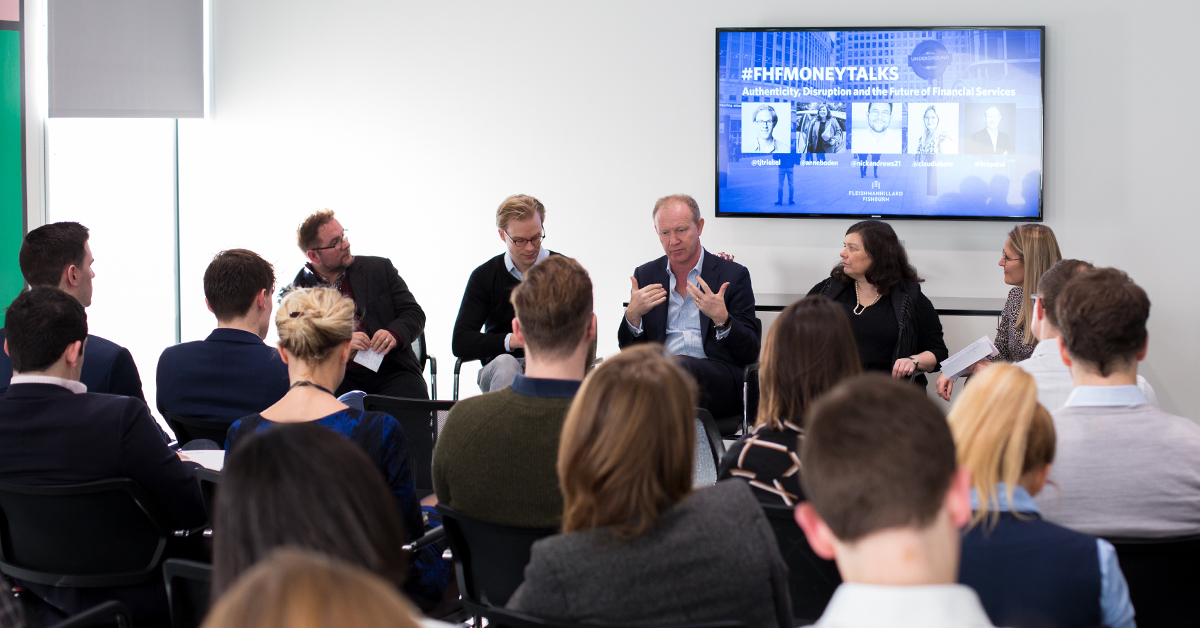Money Talks: authenticity, disruption and the future of financial services

FleishmanHillard Fishburn recently hosted the first in our new “Money Talks” series, gathering business leaders from across the financial services industry to discuss and debate the findings from our global Authenticity Gap research, and what it might tell us about the future for the sector.
Chaired by Claudia Bate, Head of Financial Services and Fintech, our esteemed panel included Anne Boden, CEO and founder of Starling Bank, Toby Triebel, CEO Europe at Wealthsimple, Paul Lockstone, Managing Director, Corporate Communications at Barclays and Nick Andrews, Senior Partner and EMEA reputation lead at FleishmanHillard Fishburn.
The wide-ranging discussion covered everything from FinTech and disruption, through to regulation, customer relations, fake news and the role of the Chief Executive. Here are a few things we learnt:
Without a focus customer care, the sheen of innovation will wear off
Interestingly our research showed that despite the amount of R&D investment in recent years, innovation is generally not one of the biggest drivers of reputation in the financial services sector. It ranks fifth of the nine drivers for the banking sector. Anne Boden, chief executive of digital-only bank Starling said that ‘innovation and technology is only truly useful when it is used to improve the customer experience. The real winners will be firms that are able to shrink their cost base and be profitable, whilst also maintaining the highest standards of customer care”.
Good communications will be key as open banking shakes up the sector
Next year, a new wave of regulation is set to sweep across Europe, including the Payments Services Directive (PSD2) which will have considerable ramifications for the financial services sector. Open Banking will effectively force the big UK banks to open up their customer directories and give consumer control over who else can see their financial information. While this will undoubtedly be a huge step forward for transparency in the sector, it does also open the door for repercussions if not handled correctly. Our panel agreed that as we navigate these new waters, solid communications will be key to managing a brand’s wider reputation in the market.
The bar has been for raised for FinTech companies to “do good” for society
Our authenticity gap revealed that FinTech companies are unanimously falling short on expectations on ‘doing right’. Our panel agreed that just as new FinTech brands have sought to distance themselves from the traditional financial institutions they are seeking to disrupt, they are also increasingly held to a much higher standard from their customers; who expect a different level of service and commitment to ethical behaviour.
Financial firms need a ‘network of brand voices’, not just the CEO
One of the more telling results from our survey, was that CEOs are one of the least trusted – or believable – sources of information, and consumers are far more willing to listen to employees and friends or family. For the CEO who has traditionally been the chief mouthpiece for large organisations, this raises question marks about their role as the primary spokesperson. Paul Lockstone pointed to the emphasis Barclays has placed on humanising communications, and employing a local strategy across the UK – championing longstanding employees and customers, and using carefully curated content to engage with customers on a personal level. In his view, it is critical that communications teams develop and use a ‘network of voices’ throughout their organisation, as they will become the strongest brand advocates.
What is clear is that financial services is ripe for further disruption. And if new entrants are able to combine innovative solutions, genuine customer care and authentic communications that focus on their ‘corporate purpose’, we may well see them claim a leadership position in the years to come.
As our Money Talks series continues, FHF London will continue to examine how financial companies can adapt to the ever changing landscape and use authenticity as a potent tool in their armoury.
Ludo Baynham-Herd, Financial and Corporate Communications
Find Out More
-
Achieving Outsized Impact by Building Stronger Country Reputation
February 18, 2025


